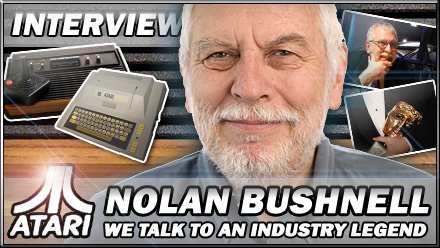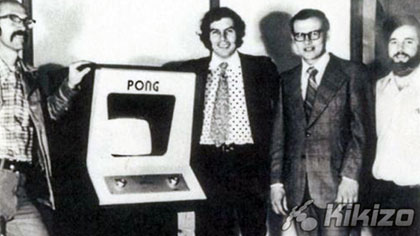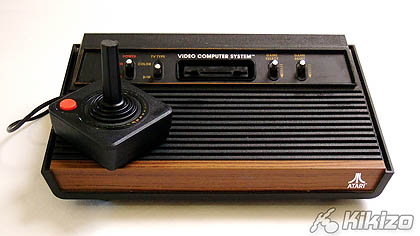Nolan Bushnell Interview
We sit down with one of the founding fathers of the games industry, creator of Pong and Atari legend Nolan Busnell, for an extensive chat about gaming past, present and future.

It's remarkable when you look at today's games industry - huge, rich and fast-moving as it is - to think that it can all be traced back to the efforts of one man. But it can, and that man is Nolan Bushnell, who these days is commonly referred to as "The father of videogames" and recently received some belated recognition, in the UK at least, in the form of a BAFTA Fellowship.
Debate still rages about the very first stirrings of the games industry - although Steve Russell's Spacewar! For the DEC PDP-1 mainframe is universally agreed to be the first proper videogame, and Ralph Baer's Magnavox Odyssey the first games console. But Bushnell arrived on the scene at the right time and with the right skills - notably an intimate knowledge of the business of (mechanical) arcades and an impressive pedigree as a computer science-geek.
 Nolan Bushnell honoured at BAFTA, pictured with UK TV's Jonathan Ross
Nolan Bushnell honoured at BAFTA, pictured with UK TV's Jonathan RossCredit: BAFTA / James Kennedy
And after creating the first coin-op videogames machine, Computer Space, Bushnell followed it with the first successful coin-op videogames machine, Pong, the first successful videogame company, Atari, and the first successful videogames console, the Atari VCS. It was he who first brought games to the mass-market, paving the way to turn what had previously been the preserve of seriously esoteric hobbyists into a viable industry. And for a considerable period, Atari dominated that industry (even though Bushnell walked away from it having barely established it).
Thanks to the lovely folks at BAFTA, we managed to collar Bushnell for 30-odd minutes of intensive questioning via his mobile phone. With him somewhere in the vicinity of LA, where he lives these days. As well as taking us back to the inception of the games industry, he indulged in a philosophical discussion of the relative merits of modern versus retro games, revealed how he has rejoined the games industry and speculated about its future.
Nolan on the origins of videogaming
Having managed an arcade as a holiday job while still at high school, Bushnell found himself studying electrical engineering - crucially with access to the university's DEC PDP-1 mainframe - in the late 1960s. In 1971, he unleashed the first coin-op arcade videogames machine, Computer Space, on an unsuspecting, and largely unappreciative, public. Computer Space proved too baffling for mainstream acceptance, but Bushnell persevered, forming Atari in 1972 with business partner Ted Dabney and programmer Alan Alcorn. Having seen a pre-release demo of Ralph Baer's Magnavox Odyssey, the first console, Bushnell challenged Alcorn to make its tennis game more compelling, and the outcome was Pong, the first videogame to take the world by storm.
Kikizo: I'd like to take you back a bit - you're known as the father of the games industry. But where did it all start for you? You had access to a DEC PDP-1 and Spacewar! at university?
Bushnell: Yes. I sort of stand on the shoulders of a guy named Steve Russell, who programmed the PDP-1 in, I think, 1962. I played the game when I was in college, and I thought: "Hey, there's a business here if I can drop the cost." So I did, and it worked (laughs).
Kikizo: Then you created Computer Space, which was the first coin-op games machine?
Bushnell: That's correct. I was actually the manager of the games department of an amusement park when I was at college, so I understood the coin-op side of the games business very well. That was an easy place to enter, because you didn't have to drive costs down so much. In the consumer marketplace, costs become even more draconian.
Kikizo: But you weren't entirely happy with its success? There was a sense that it was perhaps too complex and people were baffled by it?
Bushnell: No question about it. I like to say that all my friends loved it, but all my friends were engineers.
Kikizo: What were those days like? How much drive did you have to have, and how obsessed did you have to be to even turn it into a product and get it on sale?
Bushnell: It was very, very difficult. Everything was very hard. A lot of people don't realise that a video screen sucks data at a massive rate. And the logic in those days was just mind-numbingly slow. So you really had to perform tricks to get the information out fast enough. Processors in those days had clock speeds of 200,000Hz - 2kHz; not even a Megahertz, let alone a Gigahertz.
Kikizo: What was the story behind Pong and the Atari 2600? Had you already had the idea for a home console? Had you had many dealings with Ralph Baer at that stage?
Bushnell: Not really - we were in a situation where we had created a whole bunch of paper designs, and the ping-pong game is sort of a standard. In fact, the very first game, even before Steve Russell, was an oscilloscope tennis game by a guy called Willie Higginbotham. We played one of those on the university machine, and seeing the Magnavox kind of reminded me of it. So I said: "This is not a very fun game -- let's make it better," never thinking that would be a commercial success. We felt that it would be a good training exercise, because it was so simple. We turned it into a game for the first time, because the essence of Pong is the way the paddle works - where you hit the ball on the paddle determines the angle at which it comes off. That little tweak turned it from a non-game into a game, and I've always felt that that innovation that Al did was the thing that made Pong really special.
Kikizo: But Ralph Baer threatened to sue you for ripping him off when Pong was a success?
Bushnell: I never thought that Ralph's attacks were worth anything. But, you know, I'm a businessman and I took the attitude that if I can license something for less than what it would cost to litigate, why not do it. Ralph talks a lot about us licensing it, but I got a paid-up licence for 0.006 per cent. That's what we call a garbage licence.







 Satoru Iwata Video Interview - the late Nintendo president spoke with Kikizo in 2004 as 'Nintendo Revolution' loomed.
Satoru Iwata Video Interview - the late Nintendo president spoke with Kikizo in 2004 as 'Nintendo Revolution' loomed. Kaz Hirai Video Interview - the first of Kikizo's interviews with the man who went on to become global head of Sony.
Kaz Hirai Video Interview - the first of Kikizo's interviews with the man who went on to become global head of Sony. Ed Fries Video Interview - one of Xbox's founders discusses an epic journey from Excel to Xbox.
Ed Fries Video Interview - one of Xbox's founders discusses an epic journey from Excel to Xbox. Yu Suzuki, the Kikizo Interview - we spend time with one of gaming's most revered creators.
Yu Suzuki, the Kikizo Interview - we spend time with one of gaming's most revered creators. Tetris - The Making of an Icon: Alexey Pajitnov and Henk Rogers reveal the fascinating story behind Tetris
Tetris - The Making of an Icon: Alexey Pajitnov and Henk Rogers reveal the fascinating story behind Tetris Rare founders, Chris and Tim Stamper - their only interview? Genuinely 'rare' sit down with founders of the legendary studio.
Rare founders, Chris and Tim Stamper - their only interview? Genuinely 'rare' sit down with founders of the legendary studio. The History of First-Person Shooters - a retrospective, from Maze War to Modern Warfare
The History of First-Person Shooters - a retrospective, from Maze War to Modern Warfare